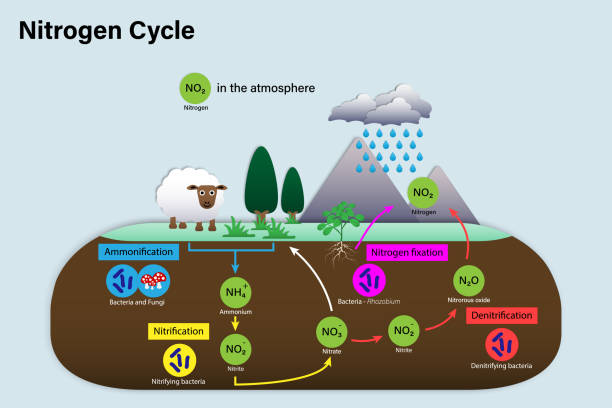This content is for informational and educational purposes only. Always consult a qualified healthcare provider.
Last Updated on February 12, 2024 by Grace Oluchi
Nitrogen fixation is the process by which nitrogen gas (N₂) from the air is converted into more reactive forms, primarily ammonia (NH₃) or nitrate (NO₃⁻). These compounds serve as vital nutrients for plants, which then become food for animals and humans. Without nitrogen fixation, life as we know it would be impossible.
📋 Table of Contents
How Does Nitrogen Fixation Happen?
Biologically.
The majority of nitrogen fixation occurs through biological processes involving specialized organisms. Let’s meet the key players:
- Nitrogen-Fixing Bacteria: These helpful microbes live in the soil or form symbiotic relationships with certain plants. They possess an enzyme called nitrogenase, which breaks the strong N₂ bond and converts it into ammonia. Examples include Rhizobium (associated with legumes) and Frankia (associated with actinorhizal plants).
- Legume-Rhizobium Symbiosis: Leguminous plants (such as peas, beans, and clover) host nitrogen-fixing bacteria in their root nodules. In exchange for shelter, the bacteria provide ammonia to the plant. This partnership helps both parties.
- Free-Living Nitrogen Fixers: Some bacteria, like Azotobacter and Clostridium, fix nitrogen independently in the soil. They add to the nitrogen pool available to other organisms.
Abiotically.
Apart from biological processes, nitrogen fixation also occurs abiotically:
- Lightning: During thunderstorms, lightning strikes separates nitrogen molecules, allowing them to combine with oxygen and form nitrates. These nitrates eventually reach the soil.
- Industrial Nitrogen Fixation: Humans have used nitrogen fixation for agricultural purposes. The Haber-Bosch process converts N₂ into ammonia, which is used as fertilizer. This process has changed food production but comes with its environmental consequences.
The Importance of Nitrogen Fixation.
- Plant Growth: Nitrogen is a useful component of amino acids, proteins, and chlorophyll. Without it, plants cannot thrive.
- Ecosystem Balance: it maintains a delicate balance in ecosystems. Too much or too little nitrogen can disrupt the food web and soil health.
- Human Nutrition: We indirectly benefit from it through the food we eat. Legumes, grains, and vegetables owe their nitrogen content to this process.
Challenges and Solutions.
- Nitrogen Pollution: Excessive fertilizer use leads to nitrogen runoff, causing water pollution and eutrophication. Sustainable farming practices are needed.
- Climate Change: Nitrous oxide (a byproduct of nitrogen fixation) is a potent greenhouse gas. Managing nitrogen cycles can sooth its impact.
The Key Takeaway.
Next time you enjoy a plate of beans or marvel at a lush green forest, remember the hidden heroes—the nitrogen-fixing bacteria—that quietly work behind the scenes, giving our world life-sustaining nitrogen. It’s a process that changes scientific jargon and touches the very essence of human existence.
FAQs On Nitrogen Fixation.
Will Plants Ever Fertilize Themselves?
No, plants don’t fertilize themselves. But they do engage in an interesting process called auto fertilization. Some leguminous plants, like clover and soybeans, have the ability to form a symbiotic relationship with nitrogen-fixing bacteria (such as Rhizobium). These bacteria lives in specialized root nodules and convert atmospheric nitrogen into ammonia. In return, the plant provides the bacteria with sugars and shelter. So, in a way, these plants do fertilize themselves by hosting their own nitrogen factories!
Can Nitrogen Fixation Occur in Water?
Yesssss! Aquatic ecosystems also benefit from nitrogen fixation. Cyanobacteria (blue-green algae) and certain free-living bacteria in water bodies fix nitrogen. They convert N₂ into ammonia or nitrates, supporting the growth of aquatic plants and algae.
What Happens When Nitrogen Fixation Is Disrupted?
It can lead to nitrogen deficiencies. If nitrogen-fixing bacteria decline due to soil disturbances, pollution, or imbalanced agricultural practices, plants suffer. Crop yields decrease, and our ecosystems become vulnerable.
Can Humans Influence Nitrogen Fixation?
Totally! Sustainable agricultural practices, proper fertilizer management, and minimizing nitrogen pollution are ways humans can positively impact nitrogen fixation.
What About Nitrous Oxide?
Nitrous oxide (N₂O) is a byproduct of nitrogen fixation. While it contributes to greenhouse gas emissions, managing nitrogen cycles can ease its effects.

